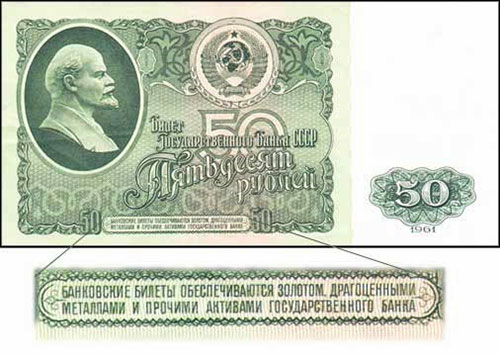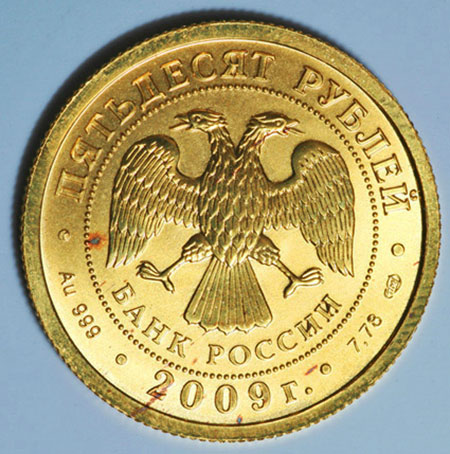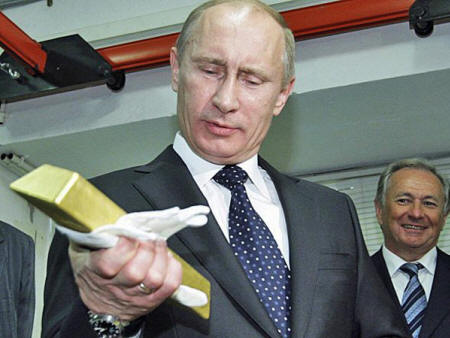Jeff Clark: Thanks for
joining us, Dmitriy. Tell us about your background.
Dmitriy Balkovskiy: I live in Moscow, but have studied
and worked in both the US and New Zealand.
I edit
Goldenfront.ru,
a Russian bullion investment news service. We translate and
publish commentary about precious metals from English-speaking
sources, including many of your articles.
We've been online
since June 2010, and our site is libertarian oriented. Our
archives now have more than 2,400 articles from 520 authors.
Jeff: You mentioned to me previously that Russia is not
quite as bullish on gold as the West portrays.
Dmitriy: It seems to me that Western gold investors are too
optimistic about Putin's love affair with gold.
The reality is
not as straightforward as it's sometimes portrayed by Western
media.
First, a little background. The old Soviet Union viewed gold and
silver as strategic metals and a matter of national security.
Private ownership of precious metals in any form except jewelry
and numismatic coins was strictly forbidden. People went to jail
for merely owning a gold bar.
The official gold content in one Soviet ruble equaled 0.167674
grams in 1936, 0.222168 grams in 1950, and 0.987412 grams in
1961.
Here's a picture of a Soviet-era 50-ruble banknote, which
amounted to the average weekly wage in the 1980s.

The highlighted writing at the bottom says,
"Banknotes are
backed by gold, precious metals, and other assets of the State
Bank."
Of course, gold was not exchangeable for rubles; it could
only be bought in jewelry form.
In 1989, it averaged 50-60
rubles per gram.
Jeff: But the USSR has been gone for a quarter-century. Hasn't
the situation with precious metals changed?
Dmitriy: Repressive Soviet laws are still on the books in
modern-day Russia.
It is illegal to buy or sell bullion bars
anywhere except at banks that have a precious metals license,
and very few have them. So if you buy or sell a gold bar from
your friend or relative, you commit a criminal offense.
There are also special rules for transportation of bullion bars,
and breaking them entails a prison term. Taking bullion bars out
of the country is illegal. Selling and buying of foreign-made
bullion bars is also illegal. To top it off, there are enormous
hurdles for bullion coin importers.
I hasten to add that these laws are not strictly enforced; there
are no gold owners languishing in Russian jails. But the laws
remain on the books.
To make matters worse, bullion bars are subject to an 18% VAT,
and as a result, spreads are enormous.
Jeff: Wow. Is it the same for coins?
Dmitriy: Coins are the only reasonably priced bullion vehicle
available for ordinary Russians.
They are not subject to as many
restrictions, are VAT-free, and sold in banks and licensed
numismatic shops.
The quarter-ounce gold St. George is popular, with four million
minted in just the past several years.
However, as many as 50%
of these coins have serious quality issues - reddish spots and
even small "craters," as you can see here below.

There is also a one-ounce silver St. George, with a 600,000
mintage.
Jeff: Are American Eagles or Canadian Maple Leafs available?
Dmitriy: Not at banks. And what is available is extremely
expensive.
As an example, the only reasonably priced gold
bullion at the Russian Agricultural Bank, one of the top 10
rated banks in Russia, is the St. George coin.
Since only banks can transact in bars and they aren't
competitive on price or selection, private investment coin
dealers fill the gap. Today Moscow boasts five or six small
companies offering gold and silver investment coins at prices
comparable to Europe or the US.
They have appeared over the past
four to five years, but are still absent in less populated
areas.
Jeff: So banks are the main source for buying bullion?
Dmitriy: Yes.
I'll note that banks are allowed to charge
premiums based on spot prices for bars, but not with coins.
Regulations list bars as "raw gold," but banks are stuck with
what they paid for coins because they're considered a "finished"
product.
If a bank paid $1,700 for a batch of gold coins, it
must resell them at this price until the whole batch is sold
off. So the banks frequently end up selling coins with markups
of 100% or more.
The vast majority of bullion outside Moscow and St Petersburg is
mostly of local mintage.
Jeff: You told me about a creative angle for smuggling.
Dmitriy: In 2012, one of our Siberian contacts, an owner of a
small gold mining operation (8,000 to 12,000 ounces annual
production), was in Moscow looking for ways to "export" his
gold.
Since he operates without a mining license, he turned his
metal into very crude cutlery and smuggled it to China as "forks
and knives."
The miner estimated that China receives about two to three
metric tons of gold per year this way, saying he knows other
"tableware makers" like him. It may be a relatively small amount
compared to official imports from Hong Kong, but it shows the
opacity of gold supply and demand here.
The Russian government still has not liberalized small-scale
gold prospecting, in spite of prior promises.
Jeff: So how does the average Russian view gold?
Dmitriy: To be honest, without any enthusiasm.
Russian Business
TV does regular polls on our investment and savings preferences,
and the latest poll showed that of 13,442 respondents, 523 were
in favor of "investing in precious metals" - less than 4% of those
surveyed.
You have an established gold-bug community in the
English-speaking world, with thousands of articles and
personalities, whereas the topic here is a complete unknown to
over 95% of the population.
I should mention that political ideology also plays a role in
shaping Russians' perceptions of gold. For liberals, the West is
flawless and will reign forever, so there is no sense in betting
against the masters of the universe and consequently, no point
in buying gold.
For conservatives both communist and nationalist, the West is
evil and forever scheming to undermine Russia.
The Rothschilds
and
the CIA rule everything, and gold investment is another one
of their frauds to rip off the Third World. It is amusing to
note how both extremes view the West as all-powerful.
Jeff: I've seen a photo of Putin holding a gold bar, and I think
he looks pretty appreciative. I'm not holding my breath that
I'll see Obama holding a bar of gold anytime soon…

Dmitriy: Yes, I know; it was the first picture of a major
politician holding a gold bar since de Gaulle. And yes, the
Russian central bank continues to buy gold.
We now have more
gold than the Swiss.
But does it make Putin a gold bug? No. He is a hardcore
pragmatist above all else. And frankly, the picture of him
holding the gold bar was done to make him look manly and
prosperous. He has an excellent PR team.
The Russian leadership is perfectly aware of gold's disruptive
role to the US dollar. But to them, the yellow metal is just
another tool. They don't care about sound money at all - they are
conservative statists, all of them.
For example,
Elvira Nabiullina, Putin's recent appointee at the
Bank of Russia, is familiar with Ludwig von Mises and is well
known in Moscow's libertarian circles.
Yet even she is about to
introduce inflation targeting… not exactly a libertarian thing
to do.
The best refutation of Putin's alleged gold-bug sympathies is
the fact that he has not abolished the VAT on bullion bars,
though there were rumors of such several years ago. Russia is
overburdened with social obligations, and the people in charge
do not wish to draw undue attention to the real alternative to
the existing monetary regime.
Western gold bugs should keep in
mind that the US dollar is not the only fiat currency around.
Jeff: Is Putin as aggressive with Ukraine as portrayed in
Western media?
Dmitriy: Putin wishes to save Russians from extinction, restore
our pre-revolutionary glory, and destroy NATO in the process.
It seems that many in the liberty crowd view the situation there
as something akin to Germany and USSR taking over Poland in
1939. It is nothing of the sort.
Ukraine is the most artificial
state in the whole of Eastern Europe, held together only by
foreign subsidies and with zero chance of long-term survival.
There is no internal cohesion.
This is not to say that everyone in the southeast of the country
wants to join Russia, although I would estimate at least half
probably wouldn't mind. The standard of living in Russia is
higher, and there's no silly "Ukrainization" sponsored by
Western taxpayers.
I would be surprised if this country lives to
see the new year in its present form.
To give a fresh example of the situation there, a couple of
weeks ago I had lunch with a lady in charge of Crimean affairs
in the Customs Ministry.
She told me,
"It is unbelievable, the whole
place seems to be frozen in the 1980s, there's nothing
there, no terminals, no equipment..."
Jeff: Do you anticipate Russians ever getting involved in
precious metals?
Dmitriy: Yes. There is actually huge potential for this to
occur.
Russians are extremely adaptable, built to survive, and
they're on a constant lookout for new opportunities.
Here are a couple of compelling statistics.
First, in 1989, it
was illegal to own foreign currencies, and 99% of the population
never even saw American dollars or German marks, let alone owned
them - but five years later, every grandma in the country had one
or two $100 notes for a rainy day.
Second, there are about 200,000 millionaires in Russia today.
Yet if you scour every coin dealer and online auction in Russia,
you will not find more than 500 one-ounce gold investment coins
at any one time. The supply is minuscule.
I firmly believe that when the existing world financial system
finally crashes and burns, as it inevitably will, Russians will
rush into precious metals. Mini-rushes, as in the fall of 2008
and August of 2011, were just a foretaste of things to come. And
when Russians stampede, I can tell you it is a sight to behold.
So I wish patience to my gold-owning colleagues all over the
world. Our time will come.
Jeff: As the saying goes, we live in interesting times. We
appreciate your input, Dmitriy.
Dmitriy: You're welcome, Jeff. We'll talk again soon. If any of
your readers would like to contact me, I can be reached at
db@goldenfront.ru.



